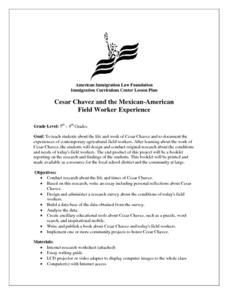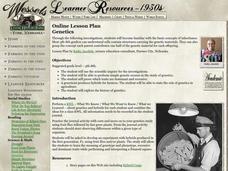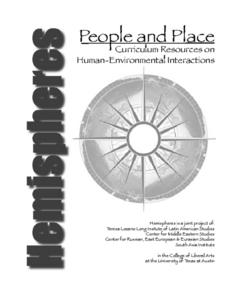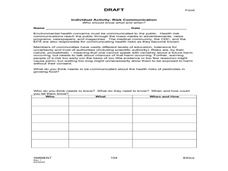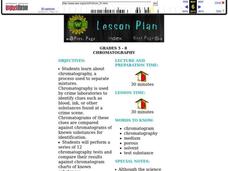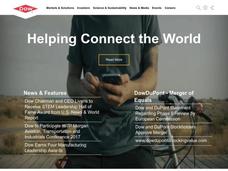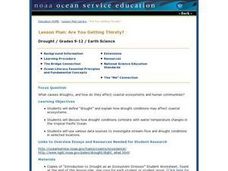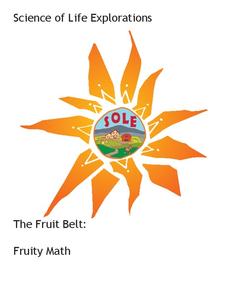American Immigration Law Foundation
Cesar Chavez and the Mexican-American Field Worker Experience
After researching and learning about the work of Cesar Chavez, your young historians will design a booklet on the conditions and needs of today's field workers and the Mexican-American field worker experience.
Curated OER
Sustainability
Here is an in-depth, and incredibly thorough lesson plan on sustainable agricultural practices; specifically, regarding the growth of coffee. After completing and discussing a worksheet called "Thinking About Tomorrow," groups of...
Curated OER
Southeast States
Fourth graders explore the Southeast States. In this social studies lesson, 4th graders study agriculture in the Southeast region of the United States. Students read about the Southeast region and discuss with a partner what they learned.
Curated OER
Genetics
Become familiar with the basic concepts of inheritance. Your junior high students work through mulitple examples of crosses and calculate probabilities of trait occurance. The explain the concept that each parent contributes one half of...
Curated OER
Anasazi Basket Weaving: 0-500 A.D.
Sixth graders study Period 1- Basket Maker 0-500 A.D. of Anasazi Culture. They identify the sequence of history in Anasazi Culture and Indians of the Mesa Verde. They discover American Indian contributions to the world and develop...
Curated OER
Biotechnology -- An Introductory Lesson to the Study of the Structure and Manipulation of DNA
Students examine the structure of DNA and how it works. They discover jobs in which use biotechnology and answer questions. They use the internet to discover other ways biotechnology can be applied.
Curated OER
The Middling Class in Deerfield:
Students study documents to show the continued growth of development of 18th century Deerfield, CT.
Curated OER
Chinese Inventions A Selected History of Science and Invention in China
Students study the history of Chinese technology by identifying when and where items were invented or discovered.
Curated OER
Study Guide for the 2009 Doris Conant Lecturer on Women and Culture: Barbara Ehrenreich
Students analyze the teachings of Barbara Ehrenreich about women and culture. In this women and culture lesson, students define "joy" and "collective joy." Students do field research on these topics and write a field report and a letter...
Curated OER
Big Dam Construction in India
This complete and full resource includes everything needed to conduct a lesson on the environmental impact of large dams in India. Background information, handouts, answer keys, and web links are all there to help you educate your class...
Curated OER
Study Of Birds
High schoolers investigate the Spanish language looking for words related to birds and their habitat. They write phrases and sentences using the words. Gradually they attempt to use the correct sentence structure in conjunction with...
Curated OER
How is Your Food Grown
Young scholars consider how their food is grown due to pesticide use. They reflect on the harm done to the various groups, then discuss the ethical questions from the perspectives of different stakeholders. IN addition, they compile...
Curated OER
African American Women Before and After the Civil War: Slavery and Freedom
Students listen to data on African American women in Texas before the Civil War. In this Civil War lesson, students compare and contrast the lives of slave and free women, and discuss case studies, locating areas on a map. Students...
Learning Games Lab
Logarithm Calculator
Support your young scientists' knowledge of logarithms with a quick video lesson. The instruction first presents the relationship between a base-10 logarithm and an exponential equation. It then demonstrates how to use a calculator to...
Curated OER
Not Just a Fish Tank
Students learn about a specific species of fish, study the effects of outside substances on the reproductive development of a fish, and explore the process of a wastewater treatment facility.
Curated OER
Chromatography
Students study about chromatography, a process used to separate mixtures.
Curated OER
Why is rice important?
Second graders examine why rice is so important to the world. In this agriculture lesson plan, 2nd graders discover the origins of rice farming. Students study how many countries depend on rice for survival. Students research countries...
Curated OER
Is There A Fungus Among Us?
Students experiment with fungi and yeast in order to determine their role in nature. Students study terms associated with fungi and yeast through this series of lessons.
Curated OER
Are You Getting Thirsty?
Students study droughts and how they affect communities and coastal ecosystems. In this ecosystems lesson students use data to examine drought conditions in certain areas.
Curated OER
Genetically Modified Organisms
High Schoolers complete a variety of activities as they examine the ethics of (and take a position concerning) genetically modified organisms in the field of agriculture. They complete a PowerPoint demonstration to go along with the unit.
K12 Reader
5th Grade Master Spelling List
Here's a spelling program that includes 36 lists of 21 words and 20 suggestions for weekly activities. Each list includes common and proper nouns, sight words, academic vocabulary, and words built on a specific Greek roots.
Cornell University
Fruity Math
Nothing sounds more delicious than fruity math! Young mathematicians solve fraction and multiplication word problems about berries, grapes, and more.
Smithsonian Institution
Strength in Solidarity: Coalition of Immokalee Workers and the Campaign for Fair Food
Not all food is created equal. The lesson dives into the world of migrant farm workers to show their struggles to earn livable wages and better working conditions. Academics learn why the Coalition of Immokalee Workers was created and...
Curated OER
Working Worms
Students study earthworms and their role in creating healthy soil for healthy food. In this earthworms and soil instructional activity, students complete an jug experiment to learn about the role of earthworms and healthy soil. Students...


